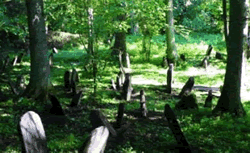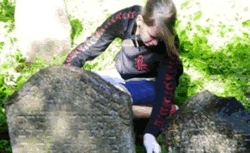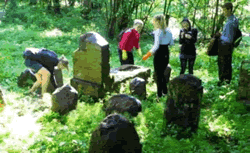Echoes from a silent past: restoring and preserving Jewish cemeteries in Lithuania
Topics: Jewish cemeteries in Lithuania, Litvak
Tuesday, July 30, 2013 12:29 pm, Posted by editor 0 | Diaspora, Jewish Lithuania Heritage Forum, Litvaks Culture, Maceva, Sergey Kanovich
inShare1
Report mistake
Old Jewish cemetery in Utena. Courtesy of Maceva
The presence of a Jewish community in Lithuania stretches back over seven hundred years. Tragically, however, the rich cultural tapestry created by this community was torn to shreds during the Holocaust, when upwards of 95 per cent of Lithuania’s Jewish community were murdered by the occupying National Socialist regime and local collaborators.
The horrors of the Holocaust often obscure the extensive history of generations upon generations of Jews who called Lithuania home over many centuries, but some organisations are making efforts to rectify this.
The Lithuania Tribune (TLT) recently sat down with Vilnius-born, and Brussels-based, poet and essayist Sergey Kanovich (Sergejus Kanovi?ius) to discuss his involvement in the non-profit organisation ‘Maceva’ (http://www.litvak-cemetery.info/en/).
This organisation aims to seek out and preserve old Jewish cemeteries in Lithuania in order to capture the few remaining threads of the cultural tapestry left behind, to remind future generations of both Jewish and non-Jewish Lithuanians at home and in the Diaspora of a world that has now vanished. The interview was conducted by the Lithuania Tribune Australian Office Managing Editor Rachel Croucher.
The Lithuania Tribune (TLT): Prior to the registration of Maceva in August 2011, how is it that people first came together as a group in order to restore and preserve Jewish cemeteries? What then inspired the group to reorganise itself as a non-profit organisation?
SK: Well, I was quite simply convinced that what had once been the hobby of a few people would bring about more results were it to become a structured organisation.
It was hoped that by better structuring the work of our volunteers, we would in turn also be able to better raise awareness of various problems related to the preservation of Jewish cemeteries in Lithuania. So by establishing a formal organisation we ultimately turned a vacation and free-time hobby into full-scale activity.
Old Jewish cemetery in Utena. Courtesy of Maceva
TLT: Could you explain to our readers the process involved in selecting which cemeteries are to be restored and in turn preserved, and then how Maceva organises its volunteers to carry out the restoration process?
There were about 220 Jewish communities scattered across Lithuania before World War II, and most of them had cemeteries. The majority of them survived the WWII for the Nazis were mainly interested in killing people, whereas the Soviets applied many efforts to erase the memories of those killed: cemeteries were desecrated, tombstones were used as building material, and there was never any attempt to preserve them.
It would not be overstating the case to say that most of the approximately 170 remaining Jewish cemeteries in Lithuania are unfortunately in very bad shape. I would go so far as to say that their dismal condition in fact reflects the state of contemporary society’s knowledge of Jewish history – it therefore requires immediate rectification. There are few exceptions which might serve as an example, but they are the exception rather than the rule.
For instance the Radvil?nai cemetery in Kaunas, which contains almost 2,000 burial plots, is the largest of the remaining Jewish cemeteries in Lithuania. This cemetery is a State Protected Heritage site, but the preservation process is moving rather slowly and any progress that is made is only due to the intervention of the State Heritage Department. Authorities are not only lacking funds; they mainly lack understanding that this is an issue of common heritage and history, something which they should be proud of.
At the same time it must be said that we enjoy a lot of support from local teachers and museums in various provinces of Lithuania; all of our activity is performed by a number of dedicated volunteers who are acutely aware of the fact that saving and preserving Jewish cemeteries is saving the last living memory of the formerly significant Jewish presence in this country. It is thus remarkably sad that even cutting the grass and the overgrowth at such sites is regarded by some as a problem due to a lack of funds, when it is in fact largely a lack of compassion and comprehension of common history.
“Them” and “us” is something which is still deeply present when it comes to the attitudes of many towards the Jewish heritage in Lithuania, namely the cemeteries. And it hurts. We cannot continuously hear officials reminding us of 700 years of common history on one side and seeing this memory being constantly neglected on the other. We also cannot expect comprehension from younger generations of Lithuanians because they have been told and taught almost nothing about those 700 years, and history at school.
We always hear the names – Gary, Heifetz, Gaon of Vilna, etc. But what tools do we offer to the modern society to understand and comprehend that those and other famous people did not come out of empty vacuum: that there was in fact a vibrant Jewish life in the country, and that cemeteries are an integral part of the cycle of life and death? Jewish cemeteries in Lithuania are the last remaining witnesses of this former Jewish life in Lithuania.
As such, building awareness of this problem among authorities and within society is one of our major tasks. The cemetery, as my father rightly says, is more a house of the living than a house for the dead; it is a house for our memory and it is clear to see that this house is rather messy.
TLT: What have been some of the more surprising and momentous discoveries – joyful or not – made by researchers as well as volunteers in the field?
There is nothing more rewarding than receiving a letter from US, Australia, Canada or South Africa saying “thank you for the work you are doing, I have recognized a grave of my great-grandfather!” We have already received a few of such letters, the credit for which should above all be bestowed upon our volunteers. We are only here in order to help them get better organised.
‘Maceva’ survives on donations with one full-time employee and draws in an annual budget of approximately 30,000 Lt (€8,700). So it’s not hard to imagine that we are not able to take care of all the cemeteries and do all the work we would very much like to do. We have to be realistic with our current means: the restoration of 4-6 cemeteries a year is the maximum we can achieve provided that our initiatives are welcomed by volunteers on the ground.
We keep thousands of pictures of headstones in our archives, but we are short of Hebrew to English translators – otherwise we would be publishing photos of the graves with names more often. We did not start from scratch: there are a number of links on our website to the organisations and people who already did some work prior to us – the credit should also go to them. As long as we cannot afford the requisite amount of massive physical work in the designated cemeteries, we concentrate on saving at least what is possible to save in our virtual library, which remains free of charge (http://www.litvak-cemetery.info/en/).
Old Jewish cemetery in Utena. Courtesy of Maceva
TLT: How much co-operation does Maceva undertake with the local Lithuanian Jewish community? Is such co-operation purely on an administrative level, or do you also have members of Lithuania’s remaining Jewish community also carrying out volunteer work in the field?
We enjoy the full support of the Lithuanian Jewish Community and its leaders, most of which serve on our Advisory Board. In the preceding two decades the Lithuanian Jewish Community performed enormous amount of work by visiting and documenting every cemetery.
However, this work was undertaken in the times of typewriters and before the era of the internet and therefore, unfortunately, none of this information is available on the web. I believe this information would be of the highest interest to national and international historians and scholars.
At the end of April, the Lithuanian Jewish Community and ‘Maceva’ held a joint event at the headquarters of the Lithuanian Jewish Community, and there was a wonderful exhibition of photographs of kids from Vilnius’ Sholom Aleychem Jewish School performing clean-up work with us at the Jewish cemetery in Mol?tai.
We often hear “Why is that THEY do not take care of the graves of their loved ones?” to which I reply: I wish we could.
We are a dying community and without the help of locals, we would not be able to manage a project of such enormity. That is the sad reality. The Lithuanian Jewish Community is trying to do its utmost to help us as well as other initiatives dedicated to the preservation of Lithuania’s Jewish heritage.
TLT: There is currently ongoing debate in Lithuania about the level of complicity of some ethnic Lithuanians with the occupying Nazi regime in the murder of the country’s Jews. Thus at the same time as educating people about the integral role Jews played in Lithuania’s history and culture for hundreds of years, do you feel ‘Maceva’ has a responsibility to take part in this debate? If so, what stance does ‘Maceva’ take on the issue?
We do not understand why some people try to drag ‘Maceva’ into political debate. It is a non-profit organisation which does not have, will not have nor will ever pursue a political agenda of any kind. At the same time, as an individual I have very clearly expressed my opinion about this ongoing debate. I can only repeat what I have said publically many times – the history is best seen with open and not closed eyes. That is to say, the Lithuanian Activist Front, as well as the Provisional Government of 1941 and its leaders, were known and have been documented as possessing virulently anti-Semitic views.
They well may have wanted only good for Lithuania, but they never wanted good for all of Lithuania’s people. That is why I cannot see them as heroes. Not only did they fail to defend my ancestors, they even did not have them in mind while planning out their vision of a free Lithuania in the future.
As far as ‘Maceva’ is concerned, if we manage to document and/or clean up just one cemetery we regard that as doing more than publishing 20 articles related to the debate where both sides appeared to be more trading fire than helping to put the fire out.
TLT: Lastly, what other organisations, both in Lithuania as well as internationally, would you ideally like to see ‘Maceva’ commence and consolidate co-operation with in the future?
I cannot agree more with our Project Co-ordinator R?ta Anulyt? – R?ta believes that every organisation dealing with and trying to preserve Jewish heritage is a valuable one. There are so many of them and each does something uniquely valuable. Maybe because of our ‘cemetery’ orientation the ones below are of somewhat more importance to us.
LitvakSIG (Lithuanian-Jewish Special Interest Group).
‘Lo Tishkach’: European Jewish Cemeteries Initiative.
‘Hanadiv’: Rothschild Foundation Europe.
We are extremely happy that various problems raised by ‘Maceva’, not to mention the work we do with volunteers, are becoming more known both in Lithuania and abroad.
Additionally, this coming August, our co-ordinator R?ta will be presenting and representing ‘Maceva’ at a major international event covering Jewish genealogy in Boston, the 33rd Annual IAGJS (International Association of Jewish Genealogical Societies) International Conference on Jewish Genealogy.
As far as Lithuania is concerned we strongly believe that with the involvement of local society, namely schools, we might be able to create a virtual library of Lithuanian Jewish cemeteries.
So far, however, we are not able to ensure that generations to come will pay deserved respect to the neighbours of their ancestors, thus it remains our core aim into the future to rectify this.


